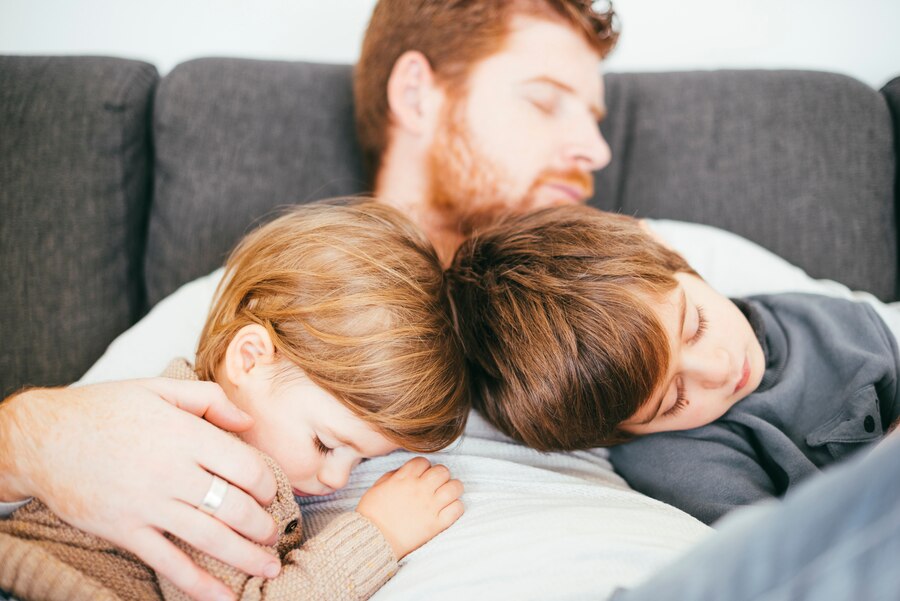Navigating the early stages of parenthood can be both joyous and challenging, with ensuring your baby gets sufficient sleep being a top priority. However, a factor often overlooked is the influence of parental stress on baby sleep. This guide delves into the relationship between parental stress and baby sleep, offering essential strategies to help both you and your baby enjoy more restful nights.

Understanding the Link: Parental Stress and Baby Sleep
The Biological Response to Stress
Stress activates the body’s release of hormones such as cortisol and adrenaline, part of the fight-or-flight response, which can keep parents on high alert and unable to relax. This state can be easily sensed by babies, making it harder for them to settle down and sleep peacefully.
Emotional Resonance: How Babies Sense Stress
Babies are incredibly sensitive to their parents’ emotional states. Known as emotional resonance, this phenomenon means that stress experienced by parents can translate into anxiety and restlessness in their babies, directly impacting their sleep patterns.
Strategies to Manage Parental Stress for Better Baby Sleep
Developing a Calming Pre-Sleep Routine
Creating a calming routine before bedtime can be beneficial not only for your baby but also for you. Activities like reading, gentle yoga, or meditation can significantly aid in reducing stress, helping both you and your baby transition into a more peaceful sleep.
Effective Stress Reduction Techniques
- Mindfulness and Meditation: Incorporating mindfulness or meditation into your daily routine can decrease stress levels and improve overall well-being, positively affecting your baby’s sleep.
- Regular Exercise: Light exercise, such as walking or stretching, can help alleviate stress and boost mood.
- Building a Support Network: Engaging with a community of parents can offer emotional support and decrease feelings of stress and isolation.

Tailoring the Sleep Environment: Parental Stress and Baby Sleep
Crafting a Peaceful Sleep Space
Ensure your baby’s sleeping area is conducive to relaxation. This means maintaining a comfortable temperature, using soft lighting, and reducing noise. A soothing environment not only supports your baby’s sleep but also helps in reducing your stress levels.
Sleep Enhancing Tools
Using tools like white noise machines or calm, soothing music can help both you and your baby achieve a deeper, more uninterrupted sleep by masking disruptive household noises.
Overcoming Common Sleep Challenges
Addressing Frequent Night Wakings
Frequent night wakings can exacerbate parental stress. Establishing a consistent routine when your baby wakes at night can teach them to self-soothe and return to sleep more quickly, helping to lower your stress levels.
Strategies for Managing Persistent Crying
Dealing with persistent crying can be stressful. Ensuring basic needs are met first is crucial. If the crying persists, techniques such as gentle rocking or soft singing can comfort your baby and reduce your stress.
Advanced Stress Management Techniques
Cognitive Behavioral Strategies
Adopting cognitive behavioral strategies can help you manage negative thoughts related to parenting stress, leading to more positive interactions during bedtime and reducing the impact on your baby’s sleep.
Enhancing Communication
Improving communication with your partner about parenting responsibilities can reduce stress by evenly distributing care duties, leading to more effective management and better sleep for everyone.
Integrating Overall Wellness into Parenting
Yoga and Physical Health
Participating in yoga can reduce physical and mental stress, promoting better sleep. It’s beneficial for both parents and babies.
Nutritional Support
A balanced diet influences mood and energy levels. Consuming foods high in omega-3s, magnesium, and vitamins can improve mood and decrease stress.
Supplemental Relaxation Techniques
To further manage parental stress and improve baby sleep, consider incorporating relaxation techniques such as guided imagery, deep breathing exercises, or progressive muscle relaxation. These methods can be performed during the day or right before bedtime to help calm the mind and body.
Conclusion
The relationship between parental stress and baby sleep is complex but manageable with the right strategies. By understanding how your stress levels impact your baby’s sleep and implementing effective stress management techniques, you can create a more serene environment conducive to better sleep for both you and your baby. This guide aims to provide you with the knowledge and tools necessary to reduce stress and improve sleep quality, paving the way for healthier and happier parenting experiences.

Dive deeper into The Connection Parental Stress and Baby Sleep by clicking: “Bedtime Routine Mastery: A Guide for Babies, Toddlers, and Pre-Schoolers”, where you’ll learn EVERYTHING you need to know.
Follow us